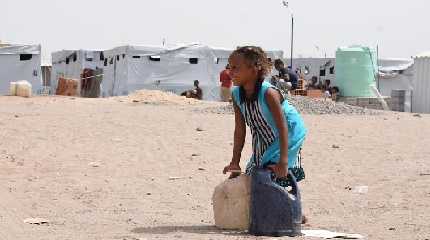
NAIROBI, April 12 (Xinhua) -- More than 29 million people are facing food insecurity in the Eastern African region, a regional bloc said in a new report launched in the Kenyan capital, Nairobi, Monday.
The Inter-Governmental Authority on Development (IGAD) said eastern Africa is facing the very real prospect that the rains will fail for a fourth consecutive season, placing Ethiopia, Kenya, and Somalia into a drought of a length not experienced in the last four decades.
Workneh Gebeyehu, executive secretary of IGAD told journalists that about 16 million are in need of immediate food assistance due to the prolonged drought caused by failed rain seasons.
"The rest are facing food insecurity due to other stress factors such as conflict in both our region and in Europe, the impact of COVID-19, and macro-economic challenges," Gebeyehu told journalists in Nairobi.
Gebeyehu said 6 to 6.5 million in Ethiopia, 3.5 million in Kenya and 6 million in Somalia have been affected by drought conditions.
He added that in the southern-central part of Somalia, the situation is catastrophic, with 81,000 people at risk of famine.
"We are facing the very real prospect that the rains will fail for a fourth consecutive season, and this is resulting in a prolonged drought," Gebeyehu noted.
He revealed that the drought has also led to severe shortages in water and pasture leading to reduced food production, significant losses in livestock and wildlife, as well as a rise in resource-based conflict in the Eastern Africa region.
IGAD called on member states, donors, and humanitarian partners to increase their emergency response in the affected countries immediately in order to avoid further worsening of the humanitarian crisis.
"We have to act now on the basis of a 'no regrets' approach," said Gebeyehu, noting that livelihood programs must be scaled up to protect the lives and livelihoods of the farmers, agro-pastoralists, and pastoralists.
This, he said, will help support their recovery and self-reliance in the immediate and medium-term.
Alessandra Casazza, manager of the UNDP Resilience Hub for Africa appealed to the respective governments, humanitarian partners, and international donors to direct efforts to prevent further worsening of the humanitarian crisis in the Eastern African region.
Casazza added that the food insecurity situation is not new and is becoming cyclical with greater intensity.
"It is imperative that we develop long-term solutions that halt the crisis from coming back," Casazza added.




